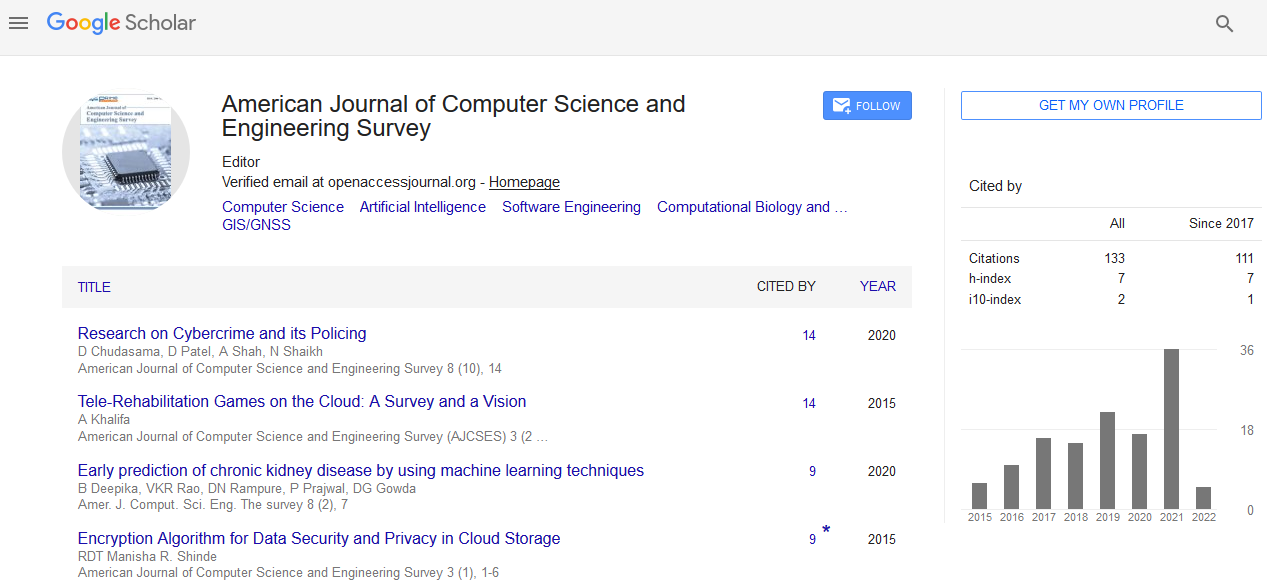Commentary - (2024) Volume 12, Issue 1
The Integration of Computer Science in the Medical Field: Innovations, Challenges, and Future Prospects
Alexander Eric*
Department of Computer Science, University of Basel, Switzerland
*Correspondence:
Alexander Eric,
Department of Computer Science, University of Basel,
Switzerland,
Email:
Received: 28-Feb-2024, Manuscript No. IPACSES-24-19977;
Editor assigned: 01-Mar-2024, Pre QC No. IPACSES-24-19977 (PQ);
Reviewed: 15-Mar-2024, QC No. IPACSES-24-19977;
Revised: 20-Mar-2024, Manuscript No. IPACSES-24-19977 (R);
Published:
27-Mar-2024, DOI: 10.36846/2349-7238.24.12.01
Description
In recent decades, the integration of computer science into the
medical field has revolutionized healthcare delivery, diagnosis,
treatment, and research. This paper explores the myriad ways in
which computer science intersects with medicine, highlighting
key innovations, addressing challenges, and envisioning future
prospects. From electronic health records (EHR) to artificial
intelligence (AI) in diagnostics, from telemedicine to wearable
health monitoring devices, the synergy between computer
science and medicine is reshaping healthcare paradigms,
promising more efficient, accurate, and personalized patient
care. The convergence of computer science and medicine has
ushered in a new era of healthcare, marked by unprecedented
advancements and opportunities. The digitization of healthcare
data, coupled with the development of sophisticated algorithms
and computational techniques, has empowered medical
professionals to enhance clinical decision-making, streamline
administrative processes, and improve patient outcomes. This
paper explores the multifaceted role of computer science
in the medical field, examining its applications, benefits,
challenges, and future directions. Electronic Health Records
(EHR): The adoption of EHR systems has transformed medical
record-keeping, enabling secure, centralized, and accessible
patient data management. Medical Imaging and Diagnostics:
Computer-aided diagnosis (CAD) systems leverage machine
learning algorithms to assist radiologists in interpreting
medical images, enhancing accuracy and efficiency.
Telemedicine and Remote Patient Monitoring: Advances in
communication technologies enable remote consultations,
virtual visits, and real-time monitoring of patients, expanding
access to healthcare services and improving continuity of care.
Personalized Medicine: Computational modeling and data
analytics facilitate the customization of treatment plans based
on individual patient characteristics, genetic profiles, and
disease trajectories. Data Privacy and Security: The digitization
of healthcare data raises concerns about privacy breaches,
data breaches, and unauthorized access, necessitating robust
cybersecurity measures and regulatory frameworks. Algorithm
Bias and Interpretability: AI-driven healthcare solutions
may perpetuate biases present in training data and lack
transparency in decision-making processes, posing challenges
to fairness, accountability, and trust. Regulatory Compliance
and Standardization: Harmonizing regulatory requirements
and interoperability standards is essential to ensure the
safe and effective implementation of computer science
technologies in healthcare settings. AI in Drug Discovery
and Development: AI-powered algorithms hold promise for
accelerating drug discovery, optimizing clinical trials, and
identifying novel therapeutic targets. Predictive Analytics and
Preventive Healthcare: Predictive modeling techniques enable
early detection of disease risks, proactive interventions, and
population health management strategies. Augmented Reality
(AR) and Virtual Reality (VR) in Medical Education and Training:
Immersive technologies enhance medical education, surgical
training, and simulation-based learning experiences, fostering
skill acquisition and clinical competency. The integration
of computer science into the medical field represents a
transformative force driving innovation, efficiency, and
quality in healthcare delivery. While challenges such as data
privacy, algorithm bias, and regulatory compliance persist, the
potential benefits of leveraging computational technologies for
improved patient care are immense.
Acknowledgement
None.
Conflict Of Interest
None.
Citation: Eric A (2024) The Integration of Computer Science in the Medical Field: Innovations, Challenges, and Future Prospects. Am J Comp Science. 12:01.
Copyright: © 2024 Eric A. This is an open-access article distributed under the terms of the Creative Commons Attribution License, which permits unrestricted use, distribution and reproduction in any medium, provided the original author and source are credited.

